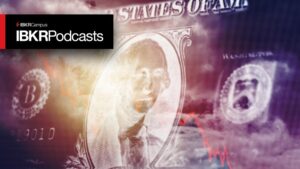A confluence of factors has put paid to calm within the US bond market: Joe Burke and Andrew Wilkinson discuss a mountain of new issuance by the US government, strength across the US economy and the impact of Bank of Japan policy causing domestic investors to favor local debt over the traditional safe haven of US debt.
Summary – IBKR Podcasts Ep. 99
The following is a summary of a live audio recording and may contain errors in spelling or grammar. Although IBKR has edited for clarity no material changes have been made.
Andrew Wilkinson
Welcome to this podcast from Interactive Brokers joining me, Andrew Wilkinson, to discuss the disruption in the US Treasury market of late is head of electronic fixed income trading here at Interactive Brokers. Joe, welcome.
Joseph Burke
Thank you, Andrew. Good to be here.
Andrew Wilkinson
So, Joe, can you put into context the rough ride investors have faced during the past month and identify what’s caused it? How have yields moved? Give us some sense of the magnitude of the problem.
Joseph Burke
Sure. I mean if you look at the the yield curve overall, and I tend to look at the two-year versus the 10-year, the yields on the two-year note in the last month or so have moved from 4.98% down to 4.64% back up to 4.98%, which is a fairly large move for a short-term instrument. The 10-year, you know also a little more volatile in general given the maturity, but you know 4.07% to 3.75%, back to 4.34%, which is, you know, up near a new high.
Andrew Wilkinson
That’s the highest in what Joe?
Joseph Burke
It’s 2007 I think.
Andrew Wilkinson
Wow. So, about 16 years.
Joseph Burke
Yeah. So, and if you look at the 2-10-year spread is inverted, as you know, it went from 90 basis points to 104 down to 65bps. So, you know just big moves and you know, it’s just a lot of volatility for many, many reasons.
Andrew Wilkinson
So, what’s changed and are we expecting more interest rate increases from the Fed?
Joseph Burke
No, I don’t think so. I think that the the Fed has stated they will be data dependent and the market is predicting that there will be one more Fed hike, most likely next month. I’m sorry most likely in November. No, no hikes expected in September. But you’re not looking for, you know, additional hikes. You can’t rule it out. But you know there are. There are a couple of factors that come into play here, and you know, one of them is supply in the market. The Treasury really surprised the market when it announced that the size of the quarterly refunding was how big it was going to be, and how much cash you needed. Also, the economy continues to impress. It’s very strong. The other thing is on July 31st when the Bank of Japan raised the cap on their bonds yields from 50 basis points to to 100 basis points. And the reason that spooks the market is because Japanese investors are big buyers of U.S. treasuries. If the Bank of Japan is sort of loosening that cap and allowing rates to rise, then Japanese investors will be incentivized to buy Japanese bonds and less and fewer treasuries, which would cause, you know, yields to rise.
Andrew Wilkinson
So, you’ve not only got the issue of more supply in the United States to fund a yawning deficit, but now Japanese buyers are more interested in buying Japanese debt.
Joseph Burke
Correct and I would add one other thing there or two other things really. There’s a higher inflation premium being demanded by investors in general, given how much we’ve seen rates move in the in the last year and a half. And secondly, dealers are committing less risk capital to the market. So, you know if they’re going to execute trades on behalf of clients, they’re getting in and out of those positions first. There’s nobody there backstopping the market, they’ll just trade out of as quickly as they can and that increases the amount of volatility in the market.
Andrew Wilkinson
So, we we’ve had this recent phrase higher for longer, I think they call it H4L. Is the market getting used to this?
Joseph Burke
Now I think so. I think that’s it’s going to be hard. The Fed may not go much further in terms of rate hikes, maybe just one more, maybe maybe two, who knows? But the expectation is going to be that the rates will stay there for a long time.
Andrew Wilkinson
What on the economic front is leading to support the view that interest rates need to stay higher for longer? We’ve looked at the labor market, but we’ve also been focused on a recession. Is the recession coming? Is that also behind this?
Joseph Burke
You know, fewer and fewer people are predicting a recession. There’s talk of a soft landing. The Fed knows the economy is still strong. Everyone talks about the lag effect of interest, monetary policy, right. It could be we just haven’t seen it yet, but for the time being, the consumer is still spending, and the economy is very strong and it’s hard to see the Fed lowering rates.
Andrew Wilkinson
So, the yield curve has gone up at the front end, but they’re really expecting the same number of hikes. But it’s just that the back end has really taken the pain here, so can you elaborate, Joe, on the impact across the different bond markets, maybe treasuries, corporates or munis, where have people been getting hurt?
Joseph Burke
Well, in corporate bonds, well, certainly in treasuries, you know there was, it didn’t necessarily get hurt, but there was certainly a lot of volatility. So, your point of entry and exit is very challenging to pick because you know you can easily get whipsawed in the marketplace. As far as Corporate Bonds, investment grade corporate bonds basically track like stocks. So, if stocks go lower credit spreads will widen out and the corporate bond prices will go lower. I don’t really see much of a correlation with munis. That’s kind of I, I really think that’s about it on that.
Andrew Wilkinson
So, Joe is the treasury market leading the stock market lower in that sense?
Joseph Burke
I think they’re independent. I don’t think that they’re really that highly correlated. I just think the volatility in the treasury market is problematic. I don’t see it necessarily leading the stock market, but the stock market does lead the corporate bond market.
Andrew Wilkinson
And again, economic strength kind of filters through here. It seems to be the winning trade, right? So, finally. Then with yields at the highest in, what do we say 16 years?, does it feel like that that the bond market is currently a good place to be?
Joseph Burke
Well, there’s certainly a lot of interest in capturing some yield. And you know treasuries, if you buy shorter-duration treasuries, you’re going to get your money back in some reasonable period of time, and you’re going to capture some yield along the way. So there, there is definitely some appeal to the the shorter end of the curve. As far as the the longer end of the curve from a personal standpoint, I think it’s going to be very hard for the Fed to get inflation down further from here. And I don’t know, given the strength of the consumer, are they ever going to stop spending? I mean you go out anywhere, just go out locally into a restaurant or a shopping center and and the number of people out and spending is just incredible to me. And then you know, the other thing that concerns me is with higher interest rates and all this borrowing, our deficits are getting much, much larger. I don’t know what the long-term implication of that is for the economy overall and for the market, but it certainly is something that would make me worry.
Andrew Wilkinson
My thanks to Joe Burke. Thanks for popping in, Joe. Don’t forget to check out more of our podcast channel and to leave us a review wherever you download your podcast from. Thank you very much Joe.
Joseph Burke
Thanks, Andy.
Join The Conversation
If you have a general question, it may already be covered in our FAQs. If you have an account-specific question or concern, please reach out to Client Services.
Leave a Reply
Disclosure: Interactive Brokers
The analysis in this material is provided for information only and is not and should not be construed as an offer to sell or the solicitation of an offer to buy any security. To the extent that this material discusses general market activity, industry or sector trends or other broad-based economic or political conditions, it should not be construed as research or investment advice. To the extent that it includes references to specific securities, commodities, currencies, or other instruments, those references do not constitute a recommendation by IBKR to buy, sell or hold such investments. This material does not and is not intended to take into account the particular financial conditions, investment objectives or requirements of individual customers. Before acting on this material, you should consider whether it is suitable for your particular circumstances and, as necessary, seek professional advice.
The views and opinions expressed herein are those of the author and do not necessarily reflect the views of Interactive Brokers, its affiliates, or its employees.


















Trying to get all my stocks up and running the right way